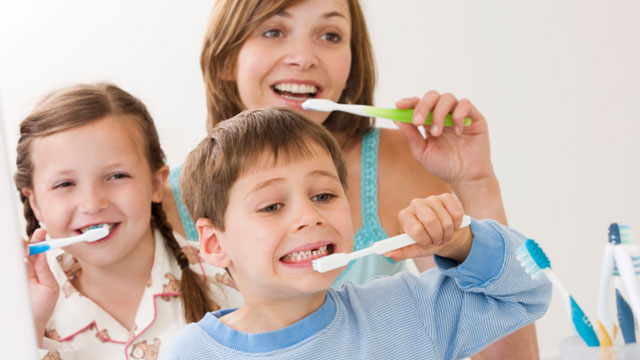As women, we already do a lot in the name of our health – namely, shelling out a whole heap of coin each month for the “luxury” items that are associated with menstruation – but when it comes to our dental health, are we doing enough, or too little, to keep our canines from cracking?
And while Gwyneth Paltrow is still yet to convince us that sex dust, in fact, works to boost your libido (sorry, Gwynnie), we still find ourselves stuck on the next-gen dental health trends.
Charcoal toothpaste, oil-pulling, fruit wraps and sugar-free gum: Do they actually work? Or, rather, do they deserve a place sitting alongside those “hormone-balancing” jade eggs goop has become synonymous with?
Here, Dr Luke Cronin, Philips Zoom ambassador and cosmetic dentist at Quality Dental in North Sydney fills us in, once and for all.
Charcoal toothpaste
What is charcoal whitening? What does it involve?
Charcoal whitening involves the use of activated charcoal (generally in capsules or a powder), which is often mixed with water to make a thick, black paste. Users then brush the paste directly on to their teeth before rinsing away the black residue.
Is it effective?
We’ve recently seen the rise of charcoal in facial products but this ingredient doesn’t belong anywhere near your teeth. Despite numerous claims by bloggers and vloggers there is no clinical evidence that activated charcoal does any good for your teeth.
In fact, it’s unclear if activated charcoal is safe as there are concerns that it may be too abrasive to use on your teeth and gums.
My advice is to consult your dentist if you’re looking to whiten your teeth; they will advise you on the most appropriate product for you to use, especially if you have concerns about sensitivity. I highly recommend sticking to the approved whitening products on the market.

Oil-pulling
What is oil-pulling? What does it involve?
Oil-pulling is an Ayurvedic procedure that claims to improve your oral and overall health by pulling or withdrawing certain ‘toxins’ from your mouth using oil. The oil’s antimicrobial properties supposedly bind with the oral bacteria in your mouth and are eliminated when you spit out the oil.
People who practice oil-pulling basically take a mouthful of oil and swish it around their mouth for up to 20 minutes.
Does it work against reversing the signs and effects of tooth decay?
The data coming out of the limited clinical studies on oil pulling to date tell us that brushing and flossing remain more effective than oil pulling when it comes to reducing oral plaque and bacteria.
The question people need to ask themselves is, even if oil pulling could reduce bacteria to the same extent as brushing and flossing, would they maintain a daily 20-minute routine of oil pulling every morning prior to eating breakfast?
If you want to give it a go there are no reported negative side effects of edible oils on soft or hard oral tissue, however, I do not recommend oil pulling as a means to achieving good oral health.

Fruit peels
What are fruit peels? What does it involve?
This isn’t like a face peel – think far more literally. You use the inside of the peel of a fruit for example, a banana skin, and rub the peel over the surface of your teeth for the suggested two minutes in a bid to remove teeth stains.
Does it actually make your teeth any whiter?
Fruit peels are not a clinically proven way to whiten your teeth. While banana peels are harmless, orange and lemon peels contain acids that can be damaging to the tooth’s enamel. Brushing afterwards exacerbates the damage to the enamel as the enamel tubules are already weakened by the acid.
The Australian Government’s Standards regulate whitening products to ensure they are both safe to use and they deliver the results they claim to make.
Enjoy fruit as part of a healthy diet but don’t expect them to remove stains from your teeth.

Sugar-free gum
What does sugar-free gum do for cleaning your teeth – is it fact or fiction that this actually works? If so, how can people benefit from it? If not, why doesn’t it work?
Sugar-free chewing gum gets a dental thumbs-up for a number of reasons. The primary benefit of chewing sugar-free gum is that it helps remove the build-up of food particles from the surfaces of your teeth after eating.
The chewing action also stimulates saliva production that helps eliminate food particles in the mouth, neutralises acids that contribute to tooth decay, as well as strengthens the tooth’s enamel.
When selecting your sugar-free gum you want to look for brands that contain Xylitol, which is a naturally occurring sweetener.
Unlike sugar, Xylitol doesn’t stimulate bacteria production so the volume of bacteria in your mouth decreases with chewing.
Another option is the dental chewing gum Recaldent, which is designed to remineralise the tooth’s enamel using the ingredient casein, part of the protein found in cow’s milk.

This Dental Health Week, Dr Cronin suggests that along with booking in regular check-ups with your dentist, you need to be mindful of the food and drinks you consume.
“It’s also really important to review your diet and ensuring you have enough balance,” he explains.
“Consuming foods and beverages that are low in acid, with a higher pH level is a good start, including whole grains, nuts, eggs, cheese, bananas, fresh vegetables, fish and lean meat – and of course water.”
“These foods can also help protect the tooth’s enamel by neutralizing the natural acids in saliva and returning calcium and phosphorus needed to restore the minerals in the enamel.”
.jpg)

